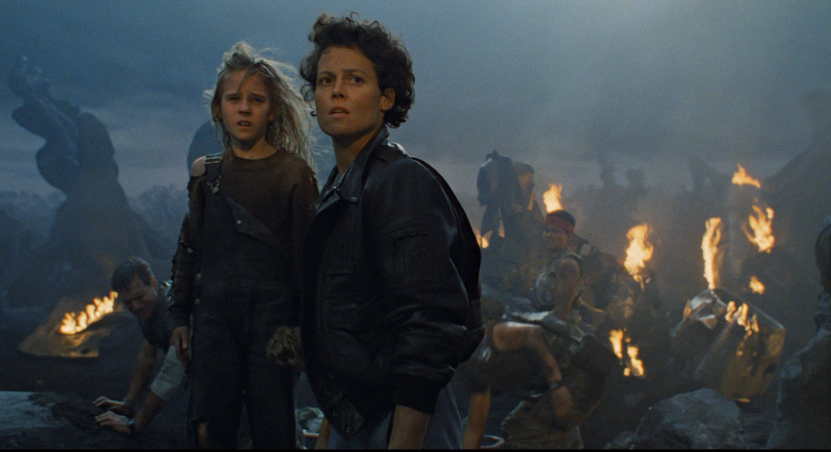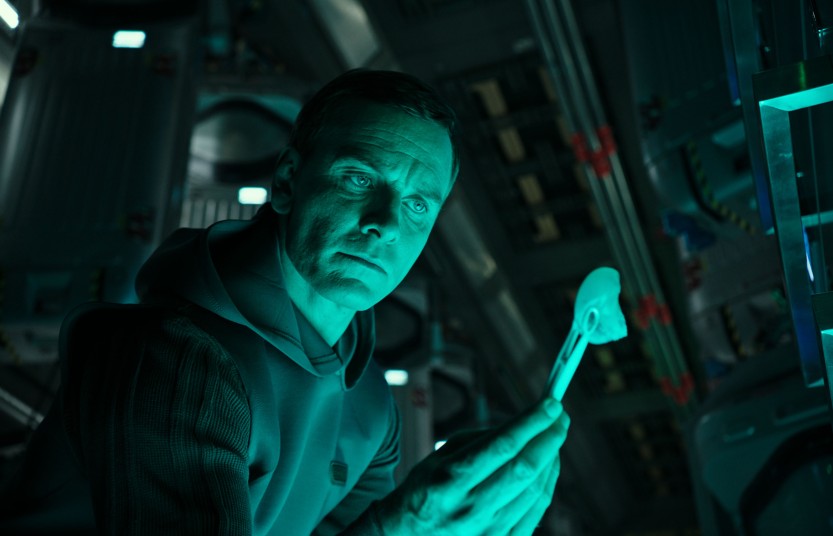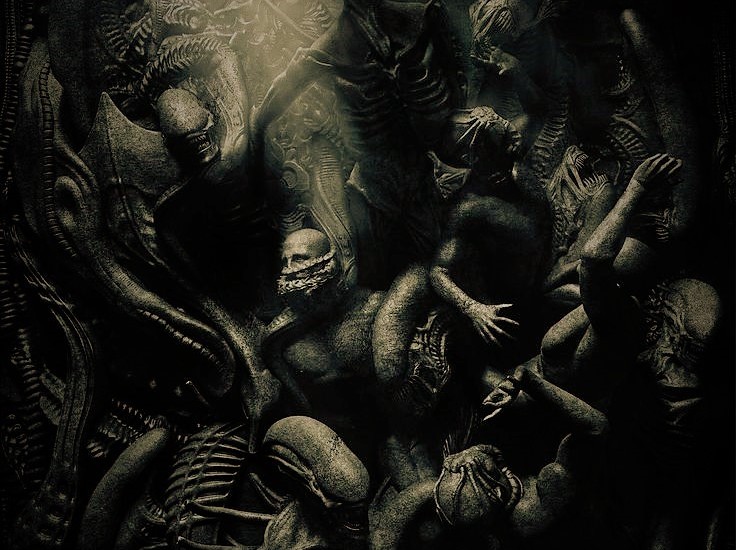Five years after the visually stunning but otherwise pretentious and ultimately hollow, Prometheus, comes Alien: Covenant. With it Ridley Scott resumes his campaign to reclaim as his own a legendary cinematic franchise that never really belonged to him.
Each film of the original Alien Quadrilogy (Alien, Aliens, Alien3, Alien: Resurrection) was blessed with a distinctly visionary director: Scott, James Cameron, David Fincher and Jean-Pierre Jeunet, respectively. Each director bringing something new to it against all odds, enhancing it as a masterful genre-hybrid; as a latent yet substantial philosophical meditation on the dysfunctional – superbly prolific or unimaginably destructive – relation between creator and creation; and as a sophisticated, satisfying mainstream entertainment.
Above all, each one of them anchored his piece of the saga’s puzzle to Ripley. Specifically Ripley as incarnated by Sigourney Weaver – an always commanding, unmistakably (and inescapably) human character, whose evolution was traced boldly, but seamlessly, genuinely. She was the rational, playing strictly by the rules officer, who grew into a fierce, androgynous warrior mother (and the archetypical female action hero), a defiant, genderless, self-sacrificing… Medea, and a motherless unknowable and at once painfully familiar alien. Because of her the original Alien Quadrilogy became, in addition to anything else, a proclamation of an all-powerful, both nourishing and lethal, nonconforming, mercurial femaleness. Or, in other words, the much maligned Other. Thus, if this saga ever belonged to only one author, this should be Weaver.

Despite its shortcomings Prometheus honoured at least that fact by putting at its helm not one, but two charismatic actresses (Noomi Rapace and Charlise Theron) more or less as the two sides of the same coin (although Theron had very little of a tangible character to sink her teeth in). Alas, in addition to its other, often glaring inefficiencies* Alien: Covenant fails even in that respect. Not only due to Katherine Waterston’s lack of charisma. Don’t get me wrong. She is a good actress. And as the Covenant ‘s second in command she is enough. But she is short of that glint in the eye, that innate inner strength that suggests the existence of something deeper – an inviting ambiguous complexity that all of her predecessors, and particularly Weaver possessed.
As it is she is unable to hold her own against Michael Fassbender in the dual role of androids Walter (of Covenant) and David (of Prometheus). And as Scott gradually shifts the anchor of his film to the latter… every self-respecting Alien fan can’t help but feel betrayed. Not because Fassbender is in any way inadequate or lacking. On the contrary. He is imposing, composed and ingenious in expressing a lot by affecting only the tiniest of changes on his facial features, mannerisms and body language. But neither as Walter nor as David is he given anything complex or particularly intriguing to do. As Walter he is nothing but an echo of Bishop – the good android, as David of Ash – the bad android. There is no conflict, no dilemma, no internal struggle for their man-made, artificial nature emanating from either of them. Hence there is no fulfilling explanation, no motive, no comprehension for each one’s behaviour. David’s blind, vengeful furry is particularly problematic (especially in light of Dr. Elisabeth Saw’s apparent kindness) even though Fassbender does his best to reign in the insufferable pompousness of his dialogues and monologues, infusing him with at least a flicker of vulnerability (when facing his “brother” or his “child”).

No. It’s the blatant, crude and pointless ripping down of the saga’s identity as a subversive feminist manifesto that is and should be maddening. It is the regression to the traditional, patriarchal idea of an almighty, unforgiving, designated/socially constituted as male creator. Still, some leniency could be afforded to Scott (and his writers) if he chose (or was able) to do so in a shrewder, sharper way. After all he had a recent, brilliantly fearless paradigm to follow and draw inspiration from: George Miller’s massively entertaining, yet astutely (and anything but patronising or overstating) political Mad Max: Fury Road where a whole saga is shifting/progressing from patriarchy to matriarchy, with Theron’s magnificent Furiosa in the driver’s sit, but without taking an inch away of the myth of the iconic character of Max.
*Where to begin? From the once again inexplicable and over-stylised opening scene? From the fact that instead of watching a genre hybrid you are left with the awkward impression of at least four different in tone and style movies:
a/ a sci-fi horror up until the explosion of the landing ship, which is the only effective, suspenseful and interesting part of the film,
b/ a no longer latent or substantial, but rather affected and over-explaining philosophical study of the creator-creation tableau, whereupon android Dave sheds tears as he quotes Byron, gives flute lessons and creatively manifests his hatred for all flesh & bones – “shall we say meat?” – beings,
c/ a full-blown, noisy action adventure reminiscent not only, obviously, of Cameron’s Aliens but also such better or worse movies of… mass destruction as Avengers: Age Of Ultron and Transformers: Dark Of The Moon, when Daniels duels with the creature on top of the rescue ship, and
d/ a gory, teenage oriented b-movie as the xenomorhp hilariously interrupts two of the youngest and most attractive members of the crew’s lovemaking in the shower?

From the fact that this proves to be another of Scott’s utterly and eerily humourless endeavours, taking itself too seriously, emphatically demanding from your senses to recognise it as art, while simultaneously lacking his distinctive, visual voice more than any other of his films? From the sheer, laughable predictability of the plot that for example renders the true identity of the android that boards the Covenant absolutely evident to anyone (off the screen) but the Covenant’s crew? From the total absence of novelty? Or from Scott’s uncharacteristic decision to constantly resort to referencing not only his films but those of his fellow Alien directors as well? In the case of Cameron he even takes a cue from The Terminator and The Abyss, offering us all of sudden, during the film’s final moments, a series of alien POVs! For no apparent or meaningful reason, much like all of his other easy and anything but intricate or organically embedded in the film references (with the sole exception of Jed Kurzel soundtrack, perhaps, which fruitfully incorporates familiar notes from all the earlier films into efficiently atmospheric melodies).
Categories: On film & other blessings

Awesome review, do you ever share your writing on any film websites?
Samuel
LikeLiked by 1 person
Thank you so much Samuel! No, not yet. Hope to though.
Ioanna
LikeLiked by 1 person
My pleasure Loanna! If you’d ever be interested, let me know if you might like to see some of your writing on Moviepilot. Would love to help.
Samuel.harries@moviepilot.com
LikeLiked by 1 person